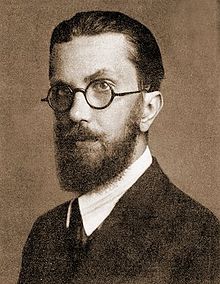Georges Florovsky
Russian Christian theologian and historian (1893–1979)
Georges Florovsky (Russian: Гео́ргий Васи́льевич Флоро́вский; September 9 [O.S. August 28], 1893 – August 11, 1979) was an Orthodox Christian priest, theologian, historian and ecumenist.

Quotes
edit- There is much in Luther that is interesting, perceptive, and true. However, there is also much that does not speak the same language as early Christianity. And herein lies the great divide in the ecumenical dialogue. For the ecumenical dialogue to bear fruit, the very controversies that separate the churches must not be hushed up. Rather they must be brought into the open and discussed frankly, respectfully, and thoroughly.
- "The Ascetic Ideal and the New Testament: Reflections on the Critique of the Theology of the Reformation"
Christianity and Culture
edit- Collected works, volume 2
- The Byzantine epoch starts if not with Constantine himself, in any case with Theodosius, and reaches its climax under Justinian. His was the time when a Christian culture was conscientiously and deliberately being built and completed as a system. The new culture was a great synthesis in which all the creative traditions and moves of the past were merged and integrated. It was a "New Hellenism," but a Hellenism drastically christened and, as it were, "churchified."
- p. 122
- It is still usual to suspect the Christian quality of this new synthesis. Was it not just an "acute Hellenization" of the "Biblical Christianity," in which the whole novelty of the Revelation had been diluted and dissolved? Was not this new synthesis simply a disguised Paganism? This was precisely the considered opinion of Adolf Harnack.
- p. 122
- Now, in the light of an unbiased historical study, we can protest most strongly against this simplification. Was not that which the XIXth century historians used to describe as an "Hellenization of Christianity" rather a Conversion of Hellenism? And why should Hellenism not have been converted? The Christian reception of Hellenism was not just a servile absorption of an undigested heathen heritage. It was rather a conversion of the Hellenic mind and heart.
- p. 123
- The early monks wanted simply to realize in full the common Christian ideal which was, in principle, set before every single believer. It was assumed that this realization was almost impossible within the existing fabric of society and life, even if it is disguised as a Christian Empire. Monastic flight in the IVth century was first of all a withdrawal from the Empire. Ascetic renunciation implies first of all a complete disowning of the world, i.e. of the order of this world, of all social ties. A monk should be "homeless," aoikos, in the phrase of St. Basil. Asceticism, as a rule, does not require detachment from the Cosmos. And the God-created beauty of nature is much more vividly apprehended in the desert than on the market-place of a busy city.
- p. 125